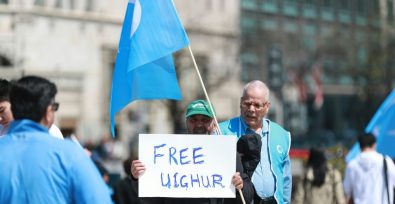The U.S. Labor Department has raised concerns about China’s expanding labor transfer program, which relocates forced laborers from the Uyghur Region to other parts of the country. Thea Lee, deputy undersecretary for international affairs at the U.S. Labor Department, highlighted the significant growth of the program, emphasizing its potential to circumvent U.S. supply-chain crackdown efforts.
The U.S. Congress has taken steps to address human rights abuses against Uyghurs and other Muslim minorities in China, including the passage of the Uyghur Forced Labor Prevention Act (UFLPA), which restricts imports from the region.
Labor transfers more prominent
Since the UFLPA came onstream in 2022, due diligence efforts have focused on screening out suppliers located in the Uyghur Region where detention and forced labor camps abound. However, state-run transfer programs are sending Uyghurs to factories around the country, making it “impossible”, according to Lee, for companies to effectively trace the presence of forced labor in their supply chains.
“I have not seen an effective way to address the challenges of monitoring the labor transfer program of workers outside of Xinjiang.”
For years, the Chinese government has covertly relocated tens of thousands of Uyghurs across China, loaded onto trains, planes, and buses, to factories supplying multiple sectors including garments, cars, seafood and electronics. This concealed coercion not only exploits human rights but also strategically distances the laborers from international scrutiny.
Reuters reports,
Some experts say alleged mass internment of Uyghurs peaked in 2018, but that abuses have continued with labor transfers becoming more prominent.
Still, China’s government has sought to make Xinjiang a heavy industry hub, and it is important for the processing of aluminum and for producing auto parts, solar components and other goods that make their way into global supply chains.
Heightened risks for supply chain compliance
This means that audits conducted in China may not effectively assess on-the-ground human rights conditions. Lee urged businesses to recognize the elevated labor and human rights risks associated with operations within China.
Rep. Christopher Smith, chair of the Congressional-Executive Commission on China (CECC), warned, “Compliance departments, please take note…”
The CECC has been cracking down on companies with strong China ties. In response to mounting pressure and public outcry, several multinational corporations have initiated a reevaluation of their operations in the Uyghur Region and China at large. Notably, German chemicals giant BASF recently announced plans to divest its stakes in joint ventures in the region. Similarly, Volkswagen is engaged in discussions with its Chinese joint venture partner regarding the future direction of its business activities in the region.
The Freedom United community ontinues to advocate for the dismantling of the Uyghur forced labor system.
Take action today and stand with us against Uyghur forced labor.





Freedom United is interested in hearing from our community and welcomes relevant, informed comments, advice, and insights that advance the conversation around our campaigns and advocacy. We value inclusivity and respect within our community. To be approved, your comments should be civil.